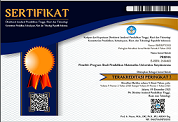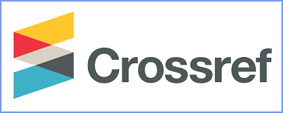The Effect of STEAM in Mathematics Learning on 21st Century Skills: A Systematic Literature Reviews
Abstract
The development of a Science, Technology, Engineering, Art, and Mathematics (STEAM)-based learning approach that is implemented with interdisciplinary knowledge has now been widely used in learning and research in mathematics education. However, the use of learning methods and their influence on 21st century skills has not been fully described. To answer these problems, research is to investigate and interpret data on the development and use of appropriate methods in the implementation of STEAM, in particular its impact on mathematics learning and 21st century skills. The author conducted a systematic literature review of published articles to produce a bibliometric review that combines quantitative descriptions of literature content and qualitative analysis of processes, outcomes, and conditions of mathematics learning using the STEAM approach from selected databases between 2012 and 2021. The results of the study used 35 articles from literature relevant to the research objectives. After conducting the analysis, it can be concluded that research related to STEAM, especially in the study of mathematics, has increased significantly in the last 5 years since 2016. From the aspect of 21st century skills, STEAM has a dominant influence in improving problem solving skills and creativity. However, the impact of collaborative and communication skills is still low. In terms of the use of learning methods, STEAM has a significant relationship with the project-based learning (PjBL) method. The results of this study can be used as confirmation material showing that STEAM and PjBL methods are an ideal combination in learning and can also be used as alternative approaches and learning methods to improve problem solving and creative abilities.
Keywords
Full Text:
PDF(BAHASA INGGRIS)References
Allina, B. (2017). The Development of STEAM Educational Policy to Promote Student Creativity and Social Empowerment, 119(2), 77–87. https://doi.org/10.1080/10632913.2017.1296392
Andrew Booth, Anthea Sutton, Mark Clowes, M. M.-S. J. (2021). Systematic Approaches to a Successful Literature Review. Sage Publications.
Anisimova, T., Anisimova, T., Sabirova, F., & Shatunova, O. (2020). Formation of Design and Research Competencies in Future Teachers in the…International Journal of Emerging Technologies in Learning (IJET), 15(2), 204–217.
Braña, F. J. (2019). A Fourth Industrial Revolution? Digital Transformation, Labor and Work Organization: A View From Spain. Journal of Industrial and Business Economics 2019 46:3, 46(3), 415–430. https://doi.org/10.1007/S40812-019-00122-0
Chu, H. E. (2021). Editorial: STEAM Education in the Asia Pacific Region. Asia-Pacific Science Education, 7(1), 1–5. https://doi.org/10.1163/23641177-BJA10026
Dejarnette, N. K. (2018). ERIC - EJ1190735 - Implementing STEAM in the Early Childhood Classroom, European Journal of STEM Education, 2018. European Journal of STEM Education.
Friedlaender, D., Wei, R. C., Chen, P.-R., & Wilczak, K. (2014). Student-Centered Learning: Dozier-Libbey Medical High School The following researchers assisted with data collection and analysis for the Student-Centered Learning series. Stanford Center for Opportunity
Policy in Education (SCOPE).
Grande, A. J., Silva, V., & Maddocks, M. (2015). Exercise for Cancer Cachexia in Adults: Executive Summary ff A Cochrane Collaboration Systematic Review. Journal of Cachexia, Sarcopenia and Muscle, 6(3), 208–211. https://doi.org/10.1002/JCSM.12055
Han, S., Capraro, R., & Capraro, M. M. (2014). How Science, Technology, Engineering, and Mathematics (Stem) Project-Based Learning (PBL) Affects High, Middle, And Low Achievers Differently: The Impact Of Student Factors On Achievement. International Journal of Science and Mathematics Education 2014 13:5, 13(5), 1089–1113. https://doi.org/10.1007/S10763-014-9526-0
Harini, E., & Taufiq, I. (2021). Persepsi Mahasiswa Pendidikan
Matematika terhadap Perkuliahan Online di Masa Pandemi Covid-19. PRISMA, 10(1), 44–53. https://doi.org/10.35194/jp.v10i1.1121
Hong, O. (2017). STEAM Education in Korea: Current Policies and Future Directions Science and Technology Trends Policy Trajectories and Initiatives in STEM Education STEAM Education in Korea: Current Policies and Future Directions. Science and Technology Trends Policy Trajectories and Initiatives in STEM Education, 8(2), 92–102.
Howlett, C., Ferreira, J. A., & Blomfield, J. (2016). Teaching Sustainable Development in Higher Education: Building Critical, Reflective Thinkers Through an Interdisciplinary Approach. International Journal of Sustainability in Higher Education, 17(3), 305–321. https://doi.org/10.1108/IJSHE-07-2014-0102/FULL/XML
Hsu, T. C., Abelson, H., Lao, N., & Chen, S. C. (2021). Is It Possible for Young Students to Learn the AI-STEAM Application with Experiential Learning? Sustainability 2021, Vol. 13, Page 11114, 13(19), 11114. https://doi.org/10.3390/SU131911114
Juandi, D. (2021). Heterogeneity of Problem-Based Learning Outcomes for Improving Mathematical Competence: A Systematic Literature Review. Journal of Physics: Conference Series, 1722(1), 012108. https://doi.org/10.1088/1742-6596/1722/1/012108
Julyanasari, N., Praja, E. S., Noto, M. V., Sunan, U., & Djati, G. (2019). Problem Based Learning Model on The Ability of Students Mathematical Connection. PRISMA, 8(2), 167–172. https://doi.org/10.35194/jp.v8i2.400
Kim, S.-H. (2017). Science, Technology, and the Imaginaries of Development in South Korea on JSTOR. https://doi.org/https://www.jstor.org/stable/90013933
Kirkwood, A., & Price, L. (2014). Technology-Enhanced Learning and Teaching in Higher Education: What is ‘Enhanced’ and How Do We Know? A Critical Literature Review. Https://Doi.Org/10.1080/17439884.2013.770404, 39(1), 6–36. https://doi.org/10.1080/17439884.2013.770404
Kitchenham, B., Brereton, O. P., Budgen, D., Turner, M., Bailey, J., & Linkman, S. (2009). Systematic literature reviews in software engineering – A systematic literature review. Information and Software Technology, 51(1), 7–15.
Kney, A. D., Tatu, J. C., Marlin, M., & Meng, X. (2016). Transforming STEM to STEAM (Work in Progress): How a traditionally run STEM camp succesfully incorporated the arts into its framework. ISEC 2016 - Proceedings of the 6th IEEE Integrated STEM Education Conference, 1–4. https://doi.org/10.1109/ISECON.2016.7457470
Lasisi, T. T., Alola, A. A., Eluwole, K. K., Ozturen, A., & Alola, U. V. (2020). The Environmental Sustainability Effects of Income, Labour Force, and Tourism Development In OECD Countries. Environmental Science and Pollution Research, 27(17), 21231–21242. https://doi.org/10.1007/S11356-020-08486-W/FIGURES/2
Li, Y., Schoenfeld, A. H., diSessa, A. A., Graesser, A. C., Benson, L. C.,
English, L. D., & Duschl, R. A. (2019). Design and Design Thinking in
STEM Education. Journal for STEM Education Research 2019 2:2, 2(2), 93–104. https://doi.org/10.1007/S41979-019-00020-Z
MacLeod, M., & van der Veen, J. T. (2019). Scaffolding Interdisciplinary Project-Based Learning: A Case Study. Https://Doi.Org/10.1080/03043797.2019.1646210, 45(3), 363–377. https://doi.org/10.1080/03043797.2019.1646210
Mary Patricia Coupland, Jason Stanley, Layna Groen, Stephen Bush, S. B. (2013). Are Science Students Ready for University Mathematics? | Coupland | Proceedings of The Australian Conference on Science and Mathematics Education. Proceedings of The Australian Conference on Science and Mathematics Education.
Maskur, R., Sumarno, Rahmawati, Y., Pradana, K., Syazali, M., Septian, A., & Palupi, E. K. (2020). The Effectiveness of Problem Based Learning and Aptitude Treatment Interaction in Improving Mathematical Creative Thinking Skills on Curriculum 2013. European Journal of Educational Research, 9(1), 375–383.
https://doi.org/10.12973/eu-jer.9.1.375
Maulani, R. L., Ruseffendi, H. E. ., & Kustiana. (2019). Improving Students’ Critical Thinking Ability and Resiliency Using Problem-Solving Approach. PRISMA, 8(1), 26–36.
Mengist, W., Soromessa, T., & Legese, G. (2020). Ecosystem Services Research in Mountainous Regions: A Systematic Literature Review on Current Knowledge and Research Gaps. Science of The Total Environment, 702, 134581. https://doi.org/10.1016/J.SCITOTENV.2019.134581
Meuleman, B., & Billiet, J. (2018). Religious Involvement : Its Relation to Values and Social Attitudes. Cross-Cultural Analysis, 181–214. https://doi.org/10.4324/9781315537078-7
Ozgur Onday. (2019). Japan’s Society 5.0: Going Beyond Industry 4.0. Business and Economics Journal. https://doi.org/10.4172/2151-6219.1000389
Ozkan, G., & Umdu Topsakal, U. (2021). Exploring the effectiveness of STEAM design processes on middle school students’ creativity. International Journal of Technology and Design Education, 31(1), 95–116. https://doi.org/10.1007/S10798-019-09547-Z/TABLES/6
Perignat, E., & Katz-Buonincontro, J. (2019). STEAM in Practice and Research: An Integrative Literature Review. Thinking Skills and Creativity, 31, 31–43. https://doi.org/10.1016/J.TSC.2018.10.002
Quigley, C. F., Herro, D., & Jamil, F. M. (2017). Developing a Conceptual Model of STEAM Teaching Practices. School Science and Mathematics, 117(1–2), 1–12. https://doi.org/10.1111/SSM.12201
Quinnell, R. (2019). Shifting from STEM to STEAM - Reflecting on Academic Identity and Scholarship. International Journal of Innovation in Science and Mathematics Education, 27(7), 1–9. https://doi.org/10.30722/IJISME.27.07.001
Sanusi, A. M., Septian, A., & Inayah, S. (2020). Kemampuan Berpikir Kreatif Matematis dengan Menggunakan Education Game Berbantuan Android pada Barisan dan Deret. Mosharafa: Jurnal Pendidikan Matematika, 9(September), 511–520.
Septian, A. (2022). Student’s Mathematical Connection Ability Through GeoGebra Assisted Project-Based Learning Model. Jurnal Elemen, 8(1), 89–98. https://doi.org/10.29408/jel.v8i1.4323
Septian, A., & Monariska, E. (2021). The Improvement of Mathematics Understanding Ability on System of Linear Equation Materials and Students Learning Motivation using Geogebra-Based Educational Games. Al-Jabar : Jurnal Pendidikan Matematika, 12(2), 371–384. https://doi.org/10.24042/ajpm.v12i2.9927
Siegle, D. (2017). Technology: Encouraging Creativity and Problem Solving Through Coding. Http://Dx.Doi.Org/10.1177/1076217517690861, 40(2), 117–123. https://doi.org/10.1177/1076217517690861
Sirisrimangkorn, L. (2018). The Use of Project-based Learning Focusing on Drama to Promote Speaking Skills of EFL Learners. Advances in Language and Literary Studies, 9(6), 14–20. https://doi.org/10.7575/AIAC.ALLS.V.9N.6P.14
Smith, O. (2015). There is an Art to Teaching Science in the 21st Century. Emerging Technologies for STEAM Education, 81–92. https://doi.org/10.1007/978-3-319-02573-5_5
Suparman, S., Juandi, D., & Tamur, M. (2021). Does Problem-Based Learning Enhance Students’ Higher Order Thinking Skills in Mathematics Learning? A Systematic Review and Meta-Analysis. ACM International Conference Proceeding Series, 44–51. https://doi.org/10.1145/3451400.3451408
Suryawan, I. P. P., & Permana, D. (2020). Media Pembelajaran Online Berbasis Geogebra sebagai Upaya Meningkatkan Pemahaman Konsep Matematika. Prisma, 9(1), 108. https://doi.org/10.35194/jp.v9i1.929
Taljaard, J. (2016). ERIC - EJ1117662 - A Review of Multi-Sensory Technologies in a Science, Technology, Engineering, Arts and Mathematics (STEAM) Classroom, Journal of Learning Design, 2016. Journal of Learning Design.
Vaidya, S., Ambad, P., & Bhosle, S. (2018). Industry 4.0 – A Glimpse. Procedia Manufacturing, 20, 233–238. https://doi.org/10.1016/J.PROMFG.2018.02.034
Wandari, Gita Ayu; Wijaya, Agus Fany Chandra; Agustin, R. R. (2018). ERIC - EJ1226301 - The Effect of STEAM-Based Learning on Students’ Concept Mastery and Creativity in Learning Light and Optics, Journal of Science Learning, 2018. Journal of Science Learning.
Wang, X., Xu, W., & Guo, L. (2018). The Status Quo and Ways of STEAM Education Promoting China’s Future Social Sustainable Development. Sustainability 2018, Vol. 10, Page 4417, 10(12), 4417. https://doi.org/10.3390/SU10124417
Wilks, K. J. (2019). Intentional Technology Integration and Digital Literacy Development: A Design-Based Insider Action Research Study. TTU DSpace Repository.
Yakman, G. (2010). What is the point of STEAM?-A Brief Overview Some of the authors of this publication are also working on these related projects: Global Languge View project Near Environments (more than Fashion) View project.
Youngwoon Lee, Shao-Hua Sun, Sriram Somasundaram, & Edward S. Hu, J. J. L. (2019). Composing Complex Skills by Learning Transition Policies | OpenReview. ICLR 2019 Conference Blind Submission.
Zharylgassova, P., Assilbayeva, F., Saidakhmetova, L., & Arenova, A. (2021). Psychological and Pedagogical Foundations of Practice-Oriented Learning of Future STEAM Teachers. Thinking Skills and Creativity, 41, 100886. https://doi.org/10.1016/J.TSC.2021.100886
DOI: https://doi.org/10.35194/jp.v11i1.2039
Refbacks
- There are currently no refbacks.
Copyright (c) 2022 PRISMA
Prisma Indexing :Â

PRISMA by UNIVERSITAS SURYAKANCANA is licensed under a This work is licensed under a Creative Commons Attribution-ShareAlike 4.0 International License.Based on a work at https://jurnal.unsur.ac.id/prisma.


1.jpg)








